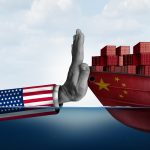
- HealthTech
200% Pharma Tariffs Threaten Europe’s Drug Exports
5 minute read

Pharmaceutical industry tariffs threaten global supply chains and raise costs for European drugmakers exporting to America
Key Takeaways
- European pharmaceutical stocks decline up to 1.6% after Trump announces potential 200% tariffs on drug imports with implementation timeline of 1-1.5 years
- Semiconductor tariffs set for August 1st with no extensions granted, targeting two critical sectors simultaneously
- Ireland faces significant export risk as pharmaceuticals account for 40% of the country’s sector exports to the U.S.
Introduction
European pharmaceutical stocks retreat across major markets as President Trump escalates trade tensions with threats of unprecedented tariffs on drug imports. The president’s announcement of potential 200% duties on pharmaceutical products sends immediate shockwaves through the sector, with companies from Novartis to Novo Nordisk posting losses in Wednesday trading.
The tariff threat represents a significant escalation in the administration’s trade policy, targeting an industry that relies heavily on global supply chains and cross-border manufacturing. Trump’s cabinet meeting declaration signals a strategic shift toward domestic pharmaceutical production, with implementation planned within the next 18 months.
Key Developments
During a cabinet meeting, Trump outlined his tariff strategy with specific timelines and rates. The president stated companies would receive approximately one year to 18 months to adjust their operations before facing the punitive duties. This grace period reflects recognition of the complex pharmaceutical supply chain adjustments required.
The announcement extends beyond pharmaceuticals to include semiconductors, with Trump setting a firm August 1st deadline for those tariffs. Commerce Secretary Howard Lutnick indicates detailed tariff studies will be completed by the end of July, though Trump retains final decision authority on implementation.
The policy builds on an April Section 232 investigation into pharmaceutical levies, which examined national security implications of drug import dependence. This investigation highlighted vulnerabilities in U.S. pharmaceutical supply chains and pushed for increased domestic production capacity.
Market Impact
European pharmaceutical giants experience immediate selling pressure in midmorning trading. Novo Nordisk leads declines with a 1.6% drop in Copenhagen, while Zealand Pharma falls 1.5%. Swiss-based Novartis retreats 0.5%, and Roche declines 0.2% as investors assess potential profit margin compression.
According to Investing.com, U.S. pharmaceutical stocks also post losses following the president’s announcement. The sector-wide decline reflects investor concerns about increased production costs and supply chain disruptions.
Market volatility extends beyond individual stocks to affect broader pharmaceutical sector valuations. The uncertainty surrounding implementation timelines and final tariff rates creates challenging conditions for long-term investment planning and strategic decision-making.
Strategic Insights
The tariff threat accelerates pharmaceutical companies’ existing trends toward supply chain localization and diversification. Companies like Johnson & Johnson, which have already diversified their portfolios across multiple market segments, appear better positioned to weather potential trade disruptions.
Ireland emerges as particularly vulnerable given its role as a major pharmaceutical exporter to the U.S. The country’s 40% share of pharmaceutical sector exports to America creates significant economic exposure to any tariff implementation. This concentration risk may prompt Irish-based operations to reassess their manufacturing and distribution strategies.
The dual targeting of pharmaceuticals and semiconductors suggests a broader administration strategy focused on critical technology and healthcare supply chain independence. This approach may accelerate reshoring initiatives while increasing production costs for companies dependent on lower-cost international manufacturing.
Expert Opinions and Data
Industry leaders warn of cascading effects from potential tariff implementation. Pharmaceutical companies indicate that 200% tariffs would create substantial cost pressures, potentially leading to higher medication prices and reduced research and development investment.
Commerce Secretary Lutnick’s timeline for detailed tariff studies provides some market clarity, though the president’s final decision authority maintains policy uncertainty. The end-of-July deadline for study completion gives companies a specific timeframe for strategic planning adjustments.
Companies like Eli Lilly and Merck, with strong innovative drug pipelines, may better absorb tariff-related cost increases through premium pricing for breakthrough therapies. However, generic drug manufacturers face more significant margin pressure from increased raw material and production costs.
Conclusion
The pharmaceutical sector confronts a fundamental shift in U.S. trade policy that threatens established global supply chains and manufacturing strategies. Companies must now balance the immediate market pressure from tariff uncertainty against long-term strategic investments in domestic production capacity.
The administration’s approach signals a sustained focus on pharmaceutical supply chain independence, with implications extending beyond individual company performance to broader international trade relationships. The industry’s response over the coming months will determine whether adaptation strategies can successfully mitigate the announced tariff impacts.








